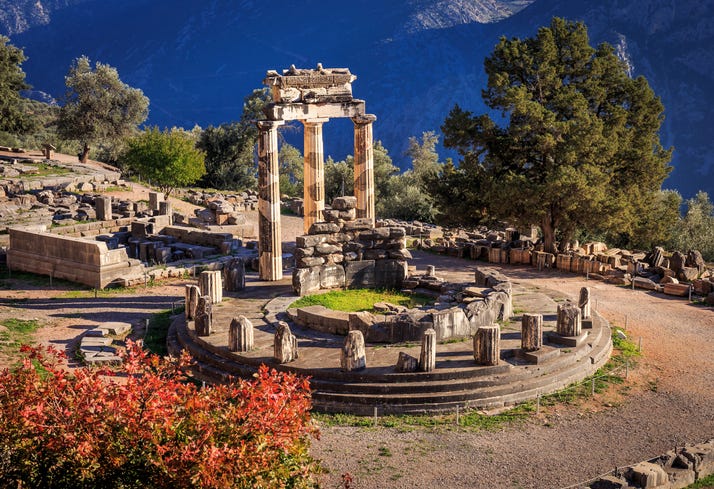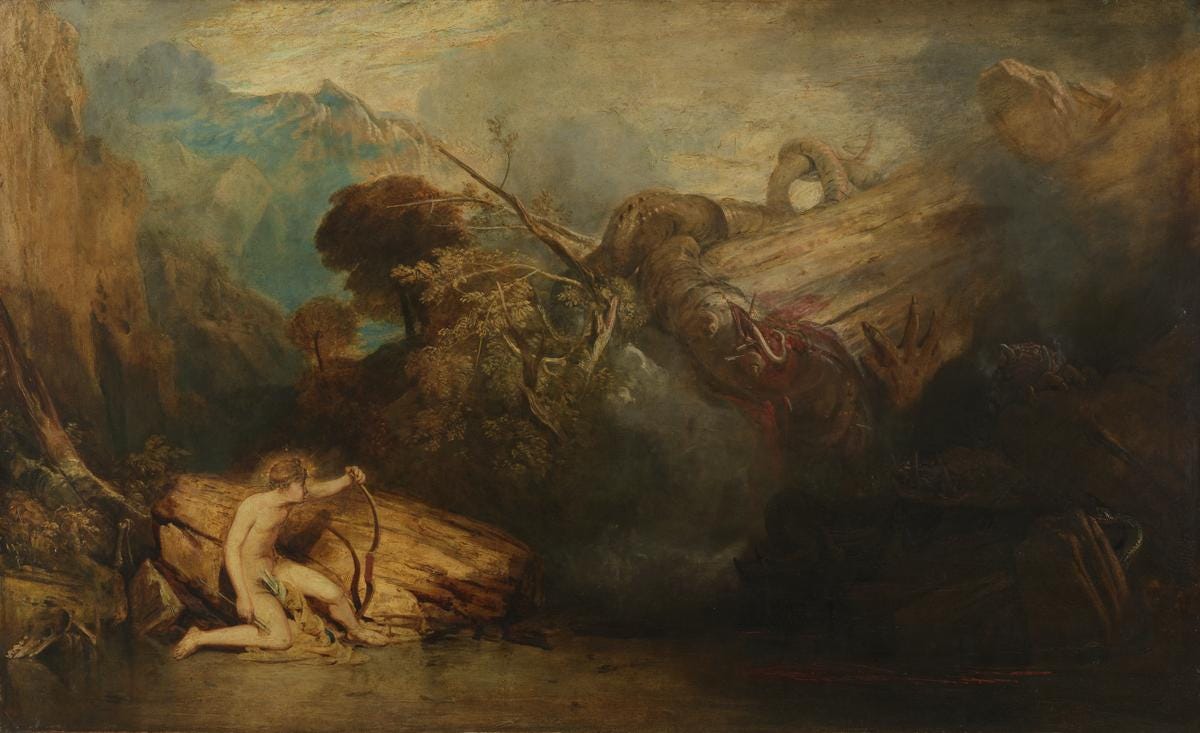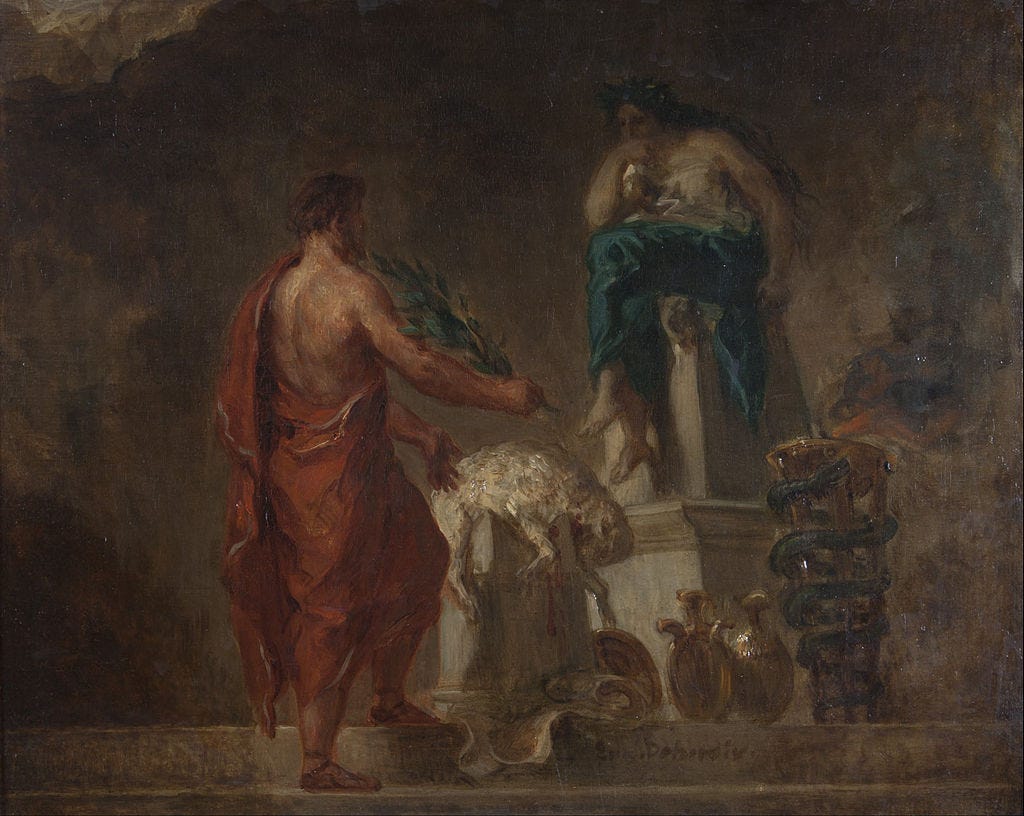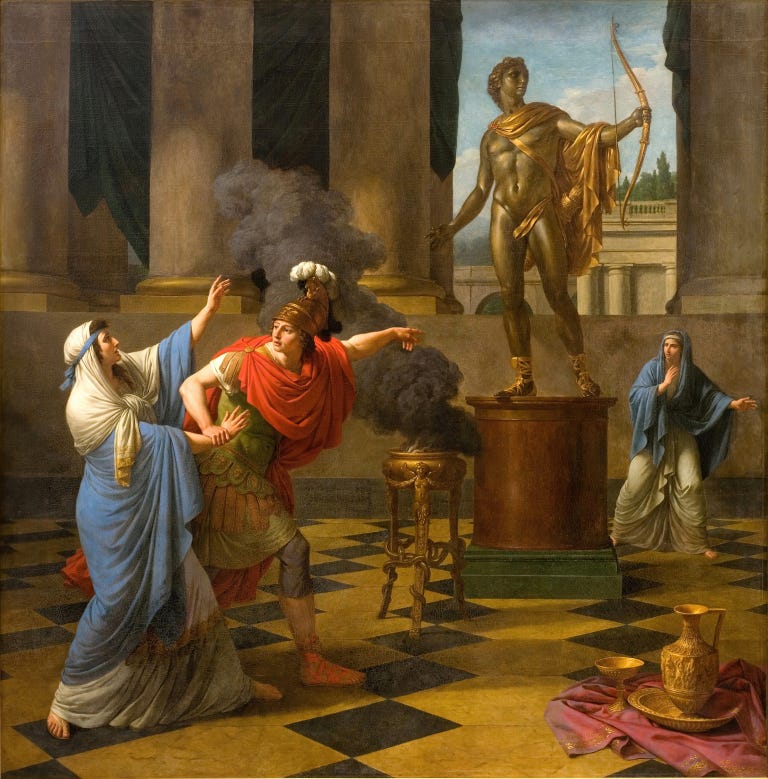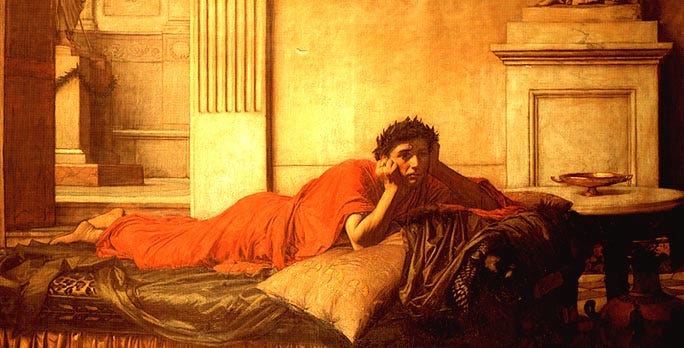Welcome on and all to the seventh edition of The Archaic Allegory. Having lent our imagination to the devil in the previous edition, today I shall bring forth a tale of belief and divine connection.
Man, the most pious of the lot, has long yearned for the distance between him and his deity to be shortened. This distance, after all, births atheism, which would overtly not be fancied by the gods. Besides, the deities need devotees so much so the devotees need the deities.
But what if I told you that the ancients were effective at summoning the divine to the earthly realm? Attempts to do so have been undertaken since the beginning of time, but the one we are about to discuss has gathered the greatest renown. Today we'll be discussing The Oracle of Delphi.
I. What is the Oracle of Delphi?
Starting with the fundamentals: What precisely is an oracle, you ask? The fact that you can't exactly solicit the gods around for a conversation over some snacks necessitates another, more indirect way to consult them. Generally, you have god-people dressed as middlemen who present your worries to the gods and relay their responses to you - an oracle is nothing more than this.
At the Greek city of Delphi, such oracles used to connect ancient humanity with the god to whom the place pays tribute - Apollo, the Greek Sun god.
The legend goes that in order to find the center of the Earth, Zeus, the king of the Greek gods, released two eagles from both extremes of the planet, and from the point where the eagles crossed each other's paths, he threw down the legendary stone Omphalos (the stone that Cronus mistook for Zeus and ate), and the place it fell thus was Delphi.
Apollo soon took control of the city, and after he slew a demon python and buried it beneath the Omphalos stone, he constructed a shrine to honor himself which eventually became the location where mortals visited to consult him and hear prophecies.
II. What exactly transpired at the Oracle of Delphi?
Returning to the earthly domain, what in fact happened at the Oracle of Delphi? Men and sometimes women, but mostly men, embarked on arduous journeys spanning days and traversing vast expanses of the world to arrive at Delphi to present their inquiries before the divine presence of Apollo. It sounds very simple, yes? But alas, it was far from it. Apollo's counsel was arduous to seek because he was only obtainable for consultation for 9 days. In one month? No, in a year. Only one day every month, and not even that for three of the winter months.
Should you successfully navigate the arduous journey, a captivating encounter awaits: The priestess of Apollo, called Pythia or the Oracle of Delphi. These Pythias, pure in virginity and spirit, hailed from within the Delphian settlements, devoted their lives to Apollo, and stood as the exclusive channels granting access to the wisdom of the Sun god.
Pythia, positioned on a tripod, would recollect the inquiries of travelers, and subsequently inhale an enigmatic vapor or smoke, believed to originate from the decaying Python's body beneath the Omphalos stone. This intoxicating fume would induce a trance-like state in her, bringing her into close proximity with Apollo for direct communication, enabling her to convey the sacred prophecies.
III. Some famous questions and prophecies at the Oracle of Delphi
Would it really be ancient if it weren’t unjust? Just the manner in which it transpires today, your importance in society, and magnitude of wealth could land you a step closer to God. At the Oracle of Delphi, the majority of devotees mostly handed out written requests and received a yes or no answer, but if you were a truly influential or wealthy person, or both, you could approach the very sanctum sanctorum of the temple itself and personally converse with Pythia and, thus, with Apollo.
Or, to counter-argue against the premise of impartiality, one might contend that Apollo personally addressed issues of higher relevance and influence. Common inquiries from the general public would include if the person in question would have a secure and peaceful future with their spouse, whether they would be able to have children, or if they would obtain a profitable career; you know, the standard stuff.
However, concerns involving governments and, in some cases, whole civilizations were accorded greater weight, and properly so. Kings and politicians would consult the oracle to determine how to navigate perilous seas or if they would be successful in capturing a kingdom.
As you will see, the prophecy was not easily fulfilled the minute it was pronounced by the Pythia since it was encrypted and muffled behind riddles and complicated word-plays untangling which was a massive undertaking in and of itself. The ethereal dialect of the gods was not intended to be easily comprehended by mortals.
1. Lycurgus
Apollo, through Pythia, uttered these words when Lycurgus, the revered lawmaker of Sparta and architect of the city-state’s military excellence, made a visit to the Oracle of Delphi:
You have come to my rich temple, Lycurgus, a man dear to Zeus and to all who have Olympian homes. I am in doubt whether to pronounce you man or god, but I think rather you are a god, Lycurgus.
The Spartan constitution, known as The Great Rhetra, is commonly accepted but not verified to have been written by Lycurgus and told by Pythia at Delphi.
2. Croesus
This incredibly wealthy and arrogant king of Lydia, Croesus determined to go the unconventional way around with the oracle. Before asking for a prophecy and blindly adhering to it, he wanted to test Apollo for which he found it suiting to ask what he was doing at a particular time in his kingdom. The oracle replied:
I know the number of the sand and the measure of the sea;
I understand the speech of the dumb and hear the voiceless.
The smell has come to my sense of a hard-shelled tortoise
being cooked with a lamb's flesh in a bronze pot:
bronze is the cauldron underneath, and bronze is the lid.
The oracle responded accurately, saying he was slaying a tortoise and roasting a lamb in a bronze-colored pot. Taking it into confidence, the king asked if he would be successful in conquering the Persian kingdom, to which the oracle answered that he "would destroy a mighty empire." Little did the unfortunate Croesus know that the mighty empire Apollo was referring to was not Persia but rather his own country Lydia. He lost his kingship after being defeated by the Persians and was taken slave.
3. Warning to Sparta
In the sight of a great battle that was to unfold, Sparta was warned at Delphi:
Sure though thy feet, proud Sparta, have a care,
A lame king's reign may see thee trip – Beware!
Troubles unlooked for long shall vex thy shore,And rolling Time his tide of carnage pour.
The oracle warned Sparta against their lame ruler Agesilaus, whose lack of legislative ability led to Sparta's first defeat and subsequent loss of power over the Greek nations at the Battle of Leuctra at the hands of the Thebans.
4. Alexander the Great
According to Plutarch, Alexander the Great, after becoming the king of the Macedonians but before embarking on his conquest to seize the Persian empire, desired to learn about his fate at the renowned Oracle of Delphi. Unfortunately, he was denied entry due to his unawareness of the temple's customary opening days for Apollo's consultations. This refusal infuriated him, leading him to forcefully enter the premises and violently seize the priestess by her hair, dragging her towards the oracle. Overwhelmed by the cruelty inflicted upon her, the priestess finally exclaimed, "You are invincible, my son!" Alexander then dropped her forcefully to the ground, declaring, "Now I have my answer."
5. Nero
The terrible Roman emperor Nero, known for his tyrannical rule and heinous killings of people near and far from him, made a visit to the Oracle and heard things he probably did not expect to learn about himself:
Your presence here outrages the god you seek. Go back, matricide! The number 73 marks the hour of your downfall!
He was so perturbed at the forecast that he had the Pythia who said it burnt alive. The number 73 became significant when Galba, who was 73 at the time, rebelled against his reign, leading to his eventual collapse and death at the age of 30.
6. The last prophecy at Delphi
After emperor Constantine turned most of the Roman kingdom's patronage and his personal beliefs to Christianity, the future ruler Julian revolted against the emperor's initiatives. Julian liberated the Delphians from taxation and provided them with protection in order to restore the original pagan faith in Rome. Following that, the emperor dispatched an embassy to Delphi, but the reaction was dismal, to say the least, and served as the spark that ignited the demise of every pagan religion in the ancient west:
Tell the king; the fair wrought house has fallen.
No shelter has Apollo, nor sacred laurel leaves;
the fountains are now silent; the voice is stilled.
It was too late. Dust had settled upon the once-vibrant Pagan religion. The echoes of a somber past resonated through the air, while an ominous mist of uncertainty enshrouded its future, painting a bleak landscape ahead. The gods foresaw all but downfall and tragedy.
This was the last ever prophecy to come from the Oracle of Delphi.
This concludes this week's edition. Until next time, accept our farewell.
Link to the source document to supplement your knowledge beyond our stories -



